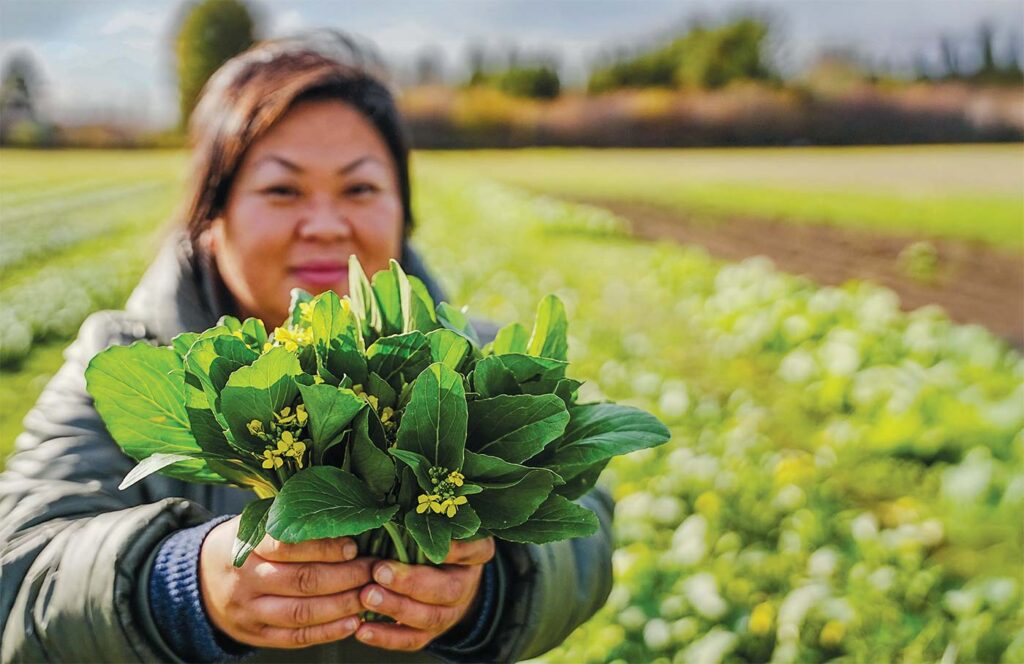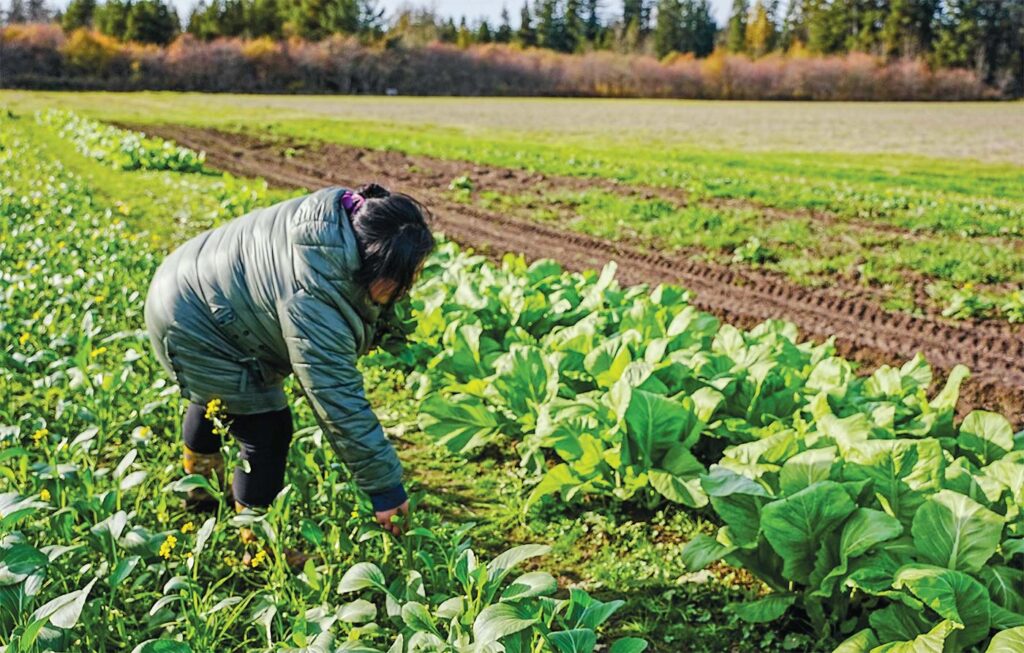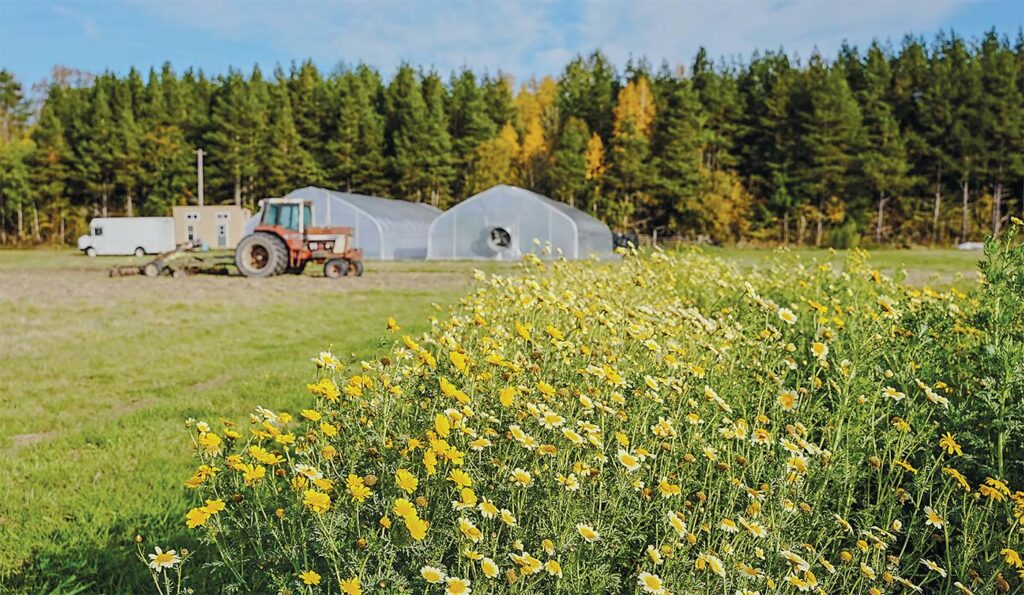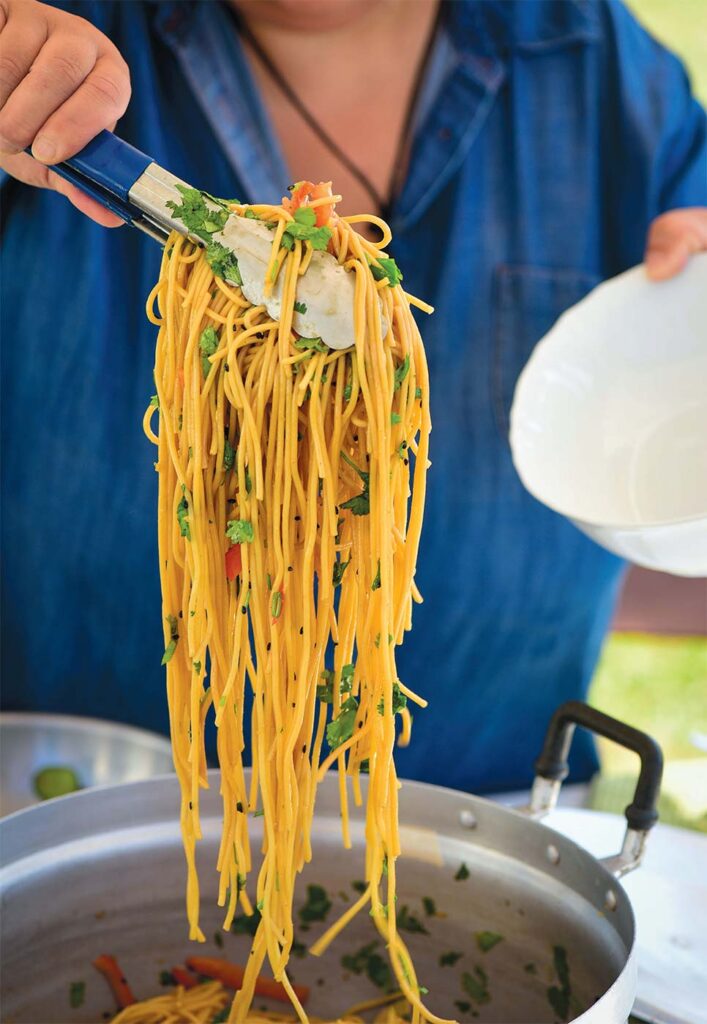
Mak’s Garden is a farmer’s tribute to loving the land after leaving it
Mak Lee spent much of her childhood on the farm where her parents worked. When she moved to Seattle to pursue a career, she never dreamt she’d find herself back there. Her family joked that she was born with a knife in her hand, and caring for people by cooking for them came naturally to her. Her strong work ethic and tenacity in kitchens throughout Seattle would eventually lead her to an influential position at one of the city’s prominent organic markets. But her dogged determination to go above and beyond found Lee putting her career before her health. It nearly killed her.
The food industry has a reputation for taking a toll on its workers, and regularly working extended, strenuous hours, especially during the holidays, put a lot of stress on Lee’s body.
“I started feeling unwell on Christmas Eve of 2019,” Lee recalls, as she walks along the foam green rows of baby bok choy and short choy sum that make up her two-acre plot of land on her family’s farm in Ethel.
Lee felt so unwell that her sister insisted she be taken to the emergency room. In the hospital—during COVID-19 no less—Lee would eventually recover, but it took nearly six months away from work, a barrage of tests and a lot of time coming to terms with just how much her job was taking from her, both physically and emotionally.
Could she continue to give so much when she was getting back so little?
Returning home to the farm to consider her next steps, she lived off her savings and benefits, brushing up on the skills she’d developed in the fields of western Washington as a child. Eventually, she would come to a decision that would change the trajectory of her life, not once, but twice.
A HMONG FARMING LEGACY
Lee and her family are Hmong, an indigenous people originating in the mountainous regions of southern China who migrated to Vietnam, Laos, Thailand and Myanmar over 300 years ago.
Immigrating to the United States in 1980, Lee’s parents received the “golden ticket” afforded to some Hmong for assisting the U.S. during the Vietnam War. Though the Hmong’s role was generally kept secret early in the conflict, many made great sacrifices, primarily through their involvement in the CIA’s covert “Secret War,” where they served as CIA-recruited soldiers in Laos, conducting guerrilla warfare, gathering intelligence and rescuing American pilots. Their support was so significant that it led to the U.S. extending resettlement and asylum opportunities to many Hmong families, who faced persecution after the war. Relocation of these political refugees, including Lee’s parents, began in the 1970s.
They settled first in Rhode Island, where Lee was born, but soon connected with family and moved to California, then to Washington, settling in Everett in the early 90s, where Lee’s parents felt their growing family would have better opportunities.
Farming was in her parents’ blood, and they relied on it to help raise their six children. It was during this time that Lee picked up her kitchen skills.
“I’m the middle daughter,” Lee says, “And as the middle daughter, traditionally in our culture, you’re taught to do a lot of the cooking and cleaning and to look after the younger siblings because my parents and older brothers and sisters all worked outside of the home.”
Lee’s mother would prepare all the food for the day, then teach her how to heat it on the stove. “I was in the kitchen learning early on, and it just felt natural to me,” says Lee.
When Lee had to move back home after her illness, it was easy to fall back into her childhood role. But given that she grew up on a farm, worked in kitchens and at markets supporting local growers, Lee questioned why her own family wasn’t selling at nearby farmers markets—instead traveling much farther to sell in Seattle and Portland.
“I asked my mom why she and my father had never considered selling to the Olympia Farmers Market, since it was a lot closer than delivering their product to Portland and Seattle,” she says. “She told me it was just easier to work with the international districts, where speaking English wasn’t a necessity.”
They also didn’t have to explain the product. “At an international market, choy sum pretty much sells itself.”
The Olympia Farmers Market is the second largest vendor-operated market in Washington and is open year-round. This got Lee thinking, couldn’t she start selling there? Lee’s mom agreed to help, but she’d have to farm her own plot of land and make the business her own. And so Mak’s Garden was born.
“My mother always tells me, ‘If no one in the family wants to continue farming, these seeds will die out. We should share them with people who love growing and who will take care of them.’ It’s a way to make sure people remember where this food comes from.” —Mak Lee

FALLING IN LOVE AGAIN
Lee grows on just two acres of land, and while she does use some farm equipment to help with planting, she mostly thins out and harvests the delicate vegetables by hand, a very labor-intensive process.
She began selling at the market in 2021. Lee admits that in the first year, she gave away more produce than she sold. She wanted to give people the opportunity to get to know her product, which was 85% Asian vegetables. Soon, she had regulars asking for her bok choy, gai lan (Chinese broccoli) and gai choy (Chinese mustard greens). If she missed a market day, she got phone calls asking where she was, and if she’d have a specific vegetable at the next market.
“People started coming to my booth because they knew they couldn’t get this product anywhere else in the region,” says Lee.
Even so, Lee isn’t gatekeeping information or her family’s seeds. Her mother has collected heirloom seeds from their family in Laos and Thailand, as well as from farmers who couldn’t pass them on because no one in their family wanted to farm.
“If she likes the seeds,” Lee explains, “She continues the growing process until they become acclimated to our region.”
Lee and her mother harvest their seeds using a method traditional in many Asian cultures, especially before the widespread use of machinery in agriculture. The practice involves letting vegetables go to seed and dry in the sun before threshing them with a bamboo stick. The crushed seeds are tossed in a basket, using the wind to blow off husks and shells. It’s a method that reflects deep ecological and cultural knowledge, and is very important to Lee.
“My mother always tells me, ‘If no one in the family wants to continue farming, these seeds will die out. We should share them with people who love growing and who will take care of them.’ It’s a way to make sure people remember where this food comes from.”
Lee strongly believes that farmers should share information and support one another. “I am a big believer in sharing knowledge,” she says. “I don’t ever want to hide it, because I feel like the more people share, the better understanding [the public will] have about food system challenges and why what farmers do is important.”
Lee enjoys educating people about the best cooking techniques for each vegetable, and showcasing her crops at each stage. Vegetables like choy sum, which contains less water in its cells, are better for high-heat presentations like stir-fries, whereas bok choy, which has more water, is well-suited for soups and braises. Lee shares crops as microgreens, as “minis” like baby bok choy, fully grown and after they’ve flowered.
“This is actually my favorite time to eat my vegetables,” Lee shares. “They’re not old, they’re just at a different stage—sweeter and more tender.”

THE LITTLE FARM THAT COULD
After farming and selling at the farmers market for three years, barriers started inhibiting the growth of Lee’s business.
“I basically plateaued. I was making enough money at the farmers market to survive, but not to invest in my business to help it grow,” she admits.
Ultimately, if she wanted to grow more produce, she needed more greenhouses to extend the growing season—a big expense, even when purchased used. And the cost wouldn’t include the labor to break down and rebuild the structure, or obtain the necessary permits required to build on the wetlands of Lewis County.
These challenges are common for small growers, and they are stressful. Lee’s work on the farm had eliminated her culinary burnout, but how much longer could she continue to grow at this scale without a better return on her investment?

Cooking and teaching people about her crops is a great passion of Lee’s. Now, she works directly with Terry Casey of O.G. Smokehouse, providing produce they can serve at the food truck.
A FOOD TRUCKLOAD OF OPPORTUNITY
When a friend invited her to grab some barbecue at a new food truck in downtown Olympia, Lee said yes.
“It was market day and I happened to have a few vegetables leftover that I didn’t feel like taking home,” Lee says. So, she approached the owner and asked if he’d consider adding some new greens to his meat-forward menu. “I showed him how I’d cook up gai choy, and he totally went for it.”
Terry Casey, pitmaster of O.G. Smokehouse BBQ, was unfamiliar with Lee’s produce, but served them as she’d suggested, similarly to collard greens. When she checked in the following week, Casey told Lee he was selling out of her greens every day. Soon she was making regular deliveries.
As the market season slowed down, Lee found herself helping Casey more at the truck, taking orders while he focused on cooking.
“I was a bit apprehensive about getting back into that side of the food industry,” admits Lee. “But knowing how to strike a healthy balance now, I found myself enjoying being back in a kitchen.”
It takes a lot of dedication to navigate the world as a solo entrepreneur. Lee and Casey are no strangers to hard work and long hours, but they began discussing ways they might collaborate that would allow both of them to expand. That winter, instead of transitioning all her produce from the field to the greenhouse, she pared down to only what would be served at the food truck, where she was cooking four to five days a week.
“I started thinking about how I could share my love of Asian produce with more people, but also bring in more money and work more efficiently,” says Lee. “I realized that even though I was educating people every day I was at the market, it wasn’t impacting my sales,” she admitted.
The opportunity to share new dishes—like hot sauce from her mother’s recipe, fresh cucumber salad with a spicy chili sauce, a cold miso-sesame-ginger noodle dish with sauteed yu choi and pea vines, chili crisp or a coconut curry kabocha squash soup—not only provided Lee the opportunity to introduce more of her produce to people, it was a more efficient way of farming. Farmers who grow for markets often need to cultivate significantly more crops than they expect to sell to mitigate unpredictable factors like drought, extreme heat or pests. The overproduction, while safeguarding against disaster, can lead to wasted crops, and is an expense entirely left with the farmer. Lee growing only enough to supply the truck means she can plant sustainably, and closer to the demand.
“I’ve come full circle,” says Lee, tossing a cold noodle salad destined for a barbecue on the farm. She now has a greater understanding of her health and where she wants her life’s path to lead. “I never said I wanted to be a millionaire, but it’s given my life dignity and meaning.
“I’m still telling people what to do with my produce,” Lee says. “But I’m also showing them what to do with it now.” Increasing public exposure to more culturally significant food, where it comes from and how it’s grown, that’s her life’s work.
“My family all now understand I’m going to be the one to carry our knowledge and love of farming and its connection with how we eat forward,” Lee says. “It’s hard work, it’s stressful wondering how to make ends meet, and whether this season’s crops will grow successfully, but you know what? This new partnership with someone who shares my culinary philosophy, and has brought back the joy of cooking as much as growing—this is mine.”
- Connect with Mak on social media at @maks.garden, and find O.G. Smokehouse BBQ at @theoneOGchef.
